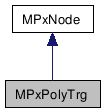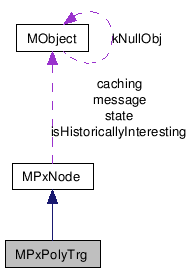MPxPolyTrg Class Reference
[OpenMaya - API
module for common classes, Proxy classes]
#include
<MPxPolyTrg.h>


Detailed Description
User defined poly triangulation support.MPxPolyTrg is the the parent class for nodes which define a custom face triangulation for meshes. In order to override default maya triangulation, the user has to do the following things:
- Derive a new node from MPxPolyTrg class.
- Define a static function on the new node to triangulate a
single face in the mesh. The signature of this function is given by
polyTrgFnct type. The input to the triangulation function
is:
- *vert - pointer to an array of vertex positions for the face. It size is 3*nbVertices.
- *norm - pointer to an array of per vertex normals for the face. It size is 3*nbVertices.
- *loopSizes - pointer to an array of loop sizes. The size of this array is nbLoops
- nbLoops - number of loops in the face.
- nbTrg - expected number of triangles to be generated.
Note: The number of vertices can be calculated by adding all the loop sizes.
The output of this function is an array of triangle description:
- *trg - pointer to an integer array. This array is already
allocated with the size of 3*nbTrg. It has to be filled with the
triangle descriptions given by the face-relative position of
vertices i.e.
nbTrg = 2 trg: 0 1 2 2 3 0
Tip: Refer to the example plugin: polyTrgNode for more details on how to implement it.
- Register that function when the node is created for the first time (in the postConstructor() method) by calling the registerTrgFunction().
- Unregister the function in the destructor by calling the unregisterTrgFunction.
Once the node is defined, the user has to inform the mesh about it. For each mesh the user wants to override the default triangulation, he has to set the usertTrg attribute on the mesh to the name under which the function has been registered.
Example: /code setAttr mesh.userTrg -type "string" "triangulate"; /endcode
Once that attribute is set, the default maya triangulation is turned off and the one provided by the user is used to draw the mesh.
Public Types |
|
| typedef void(* | polyTrgFnct )(const float *vert, const float *norm, const int *loopSizes, const int nbLoop, const int nbTrg, unsigned short *trg) |
| Pointer to a function which triangulates a
poly face. |
|
Public Member Functions |
|
| MPxPolyTrg () | |
| virtual | ~MPxPolyTrg () |
| virtual void | postConstructor () |
| virtual MStatus | compute (const MPlug &plug, MDataBlock &dataBlock) |
| virtual bool | isAbstractClass () const |
| MStatus | registerTrgFunction (char *name, polyTrgFnct f) |
| MStatus | unregisterTrgFunction (char *name) |
Constructor & Destructor Documentation
| MPxPolyTrg::MPxPolyTrg | ( | ) |
Constructor.
The constructor should never call any methods from MPxPolyTrg or make any calls that require the existence of the MObject associated with the user defined node. The postConstructor method should be used to do any initialization of this kind.
| MPxPolyTrg::~MPxPolyTrg | ( | ) | [virtual] |
Destructor.
Member Function Documentation
| void MPxPolyTrg::postConstructor | ( | ) | [virtual] |
Post constructor.
Internally maya creates two objects when a user defined node is created, the internal MObject and the user derived object. The association between the these two objects is not made until after the MPxPolyTrg constructor is called. This implies that no MPxPolyTrg member function can be called from the MPxPolyTrg constructor. The postConstructor will get called immediately after the constructor when it is safe to call any MPxPolyTrg member function.
Reimplemented from MPxNode.
| MStatus MPxPolyTrg::compute | ( | const MPlug & | plug, | |
| MDataBlock & | block | |||
| ) | [virtual] |
This method should be overridden in user defined nodes. However, fror this particaular node we don't need to to do anything in the compute functione. Therefore, all we do is return MS:kSuccess in the derive class.
- Parameters:
-
[in] plug plug representing the attribute that needs to be recomputed [in] block data block containing storage for the node's attributes
- Returns:
- Status code
- Status Codes:
-
- MS::kSuccess Compute was successful
- MS::kFailure Compute failed
Reimplemented from MPxNode.
| bool MPxPolyTrg::isAbstractClass | ( | ) | const [virtual] |
Each new node has to implement that fuction. It returns false since this is not an abstract class.
- Returns:
- False
Reimplemented from MPxNode.
| MStatus MPxPolyTrg::registerTrgFunction | ( | char * | functName, | |
| polyTrgFnct | funct | |||
| ) |
Register a triangulation function with maya. The name provided as a first argument is the name under which the function is registered. This name has to be used when setting 'userTrg' attribute on a mesh.
- Parameters:
-
[in] functName Function name under which the function is register with maya. [in] funct Pointer to the static function which implement a face triangulation.
- Returns:
- Status code
- Status Codes:
-
- MS::kSuccess Compute was successful
- MS::kFailure Compute failed
| MStatus MPxPolyTrg::unregisterTrgFunction | ( | char * | functName | ) |
- Parameters:
-
[in] functName Function name under which the function is register with maya.
- Returns:
- Status code
- Status Codes:
-
- MS::kSuccess Compute was successful
- MS::kFailure Compute failed